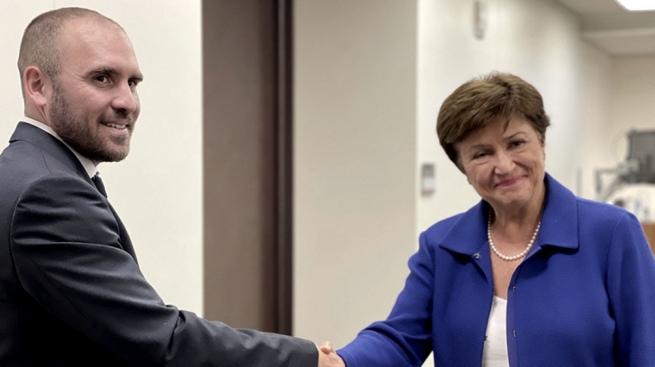National officials and economists highlighted this Saturday the agreement reached with the International Monetary Fund (IMF), considering that it allows refinancing the debt of US$ 45,000 million contracted by the government of Mauricio Macri while preserving economic growth and employment.
The agreement entered this Friday afternoon in the Chamber of Deputies and on Monday it will begin to be debated in the Budget Committee of the Lower House, with the presence of the Minister of Economy, Martín Guzmán, and other officials.
The new program – called Extended Facilities– It has a duration of two and a half years with quarterly disbursements, while their cancellation will be between 2026 and 2034.
The Minister of Productive Development, Matías Kulfasconsidered the agreement with the IMF “very important” because, without being a definitive solution to the country’s problems, “it will remove uncertainties and allow it to continue growing.”
In a dialogue with El Destape Radio, Kulfas stated that “the default scenario is a scenario of financial instability”, in which Argentina “would be further reduced by the scarce sources of financing that it has today”.
Likewise, he pointed out that “when there begins to be instability, the reaction of some sectors is to escape from the dollar, to the value that they can obtain, then the parallel prices begin to take on another speed and that naturally also complicates a lot, it has a direct impact on the levels of prices”.
Meanwhile, the Minister of the Interior, Eduardo “Wado” de Pedrosaid that the understanding with the international organization “is the beginning of the solution” and assured that “it avoids an immediate catastrophe”.
“The debt that the Cambiemos government took on was irresponsible.”Eduardo “Wado” de Pedro
“Now the IMF has to understand the new stage in which Argentina needs to maintain the level of growth and social inclusion and lower the levels of poverty,” warned the official in an interview published by the Spanish newspaper El País.
He added that “the debt that the Cambiemos government took on was irresponsible” and specified that “it was more than 44,000 million dollars, and 9 out of 10 were used to finance capital flight.”
For the Secretary for International Economic Relations of the Ministry of Foreign Affairs, Cecilia Todesca Boccothe program agreed with the IMF will allow “growth to stabilize” instead of “stabilization to grow”, and he maintained that the dissent within the political forces of the opposition and the ruling party is linked to “the size of the problem”.
“The agreement allows growth to stabilize and not stabilize to grow,” said Todesca Bocco in dialogue with Radio Miter and El Destape Radio.
The agreement allows growth to stabilize and not stabilize to grow”. Todesca Bocco
In that sense, he asserted that the Argentine economy needs to “recover reserves, generate employment and gradually reduce inflation in a very difficult context.”
“It is a feasible and reasonable agreement, and that takes into account what the Minister of Economy (Martín Guzmán) placed as the axis: take care of real spending and investment, and that Argentina can grow,” added the official.
However, he indicated that it is necessary to “advance rapidly in it to put energy on the agenda of production and work.”
For its part, the head of the Federal Administration of Public Revenues (AFIP), Mercedes Marcó del Pontmaintained that the understanding reached with the Fund is “consistent” with the government’s growth policies, and assured that it does not condition “existing exchange regulations.”
“We are clear that the IMF has not changed. We know whose interests it represents. But the truth is that the conditions of the understanding are consistent with our policies on growth, job creation, income distribution,” said Marcó del Pont in dialogue with La Red radio.
According to the head of the AFIP, this agreement “does not limit the possibility of advancing with the structural transformations necessary to shed oxygen in terms of foreign exchange generation.”
We know whose interests it represents. But the truth is that the conditions of the understanding are consistent with our policies on growth, job creation, income distribution,” Mercedes Marco del Pont
Along the same lines, Marcó del Pont pondered that “the understanding with the IMF does not condition the current exchange regulations.”
The economist specified that sustaining the mechanisms and management tools of the exchange market “is very important because the destabilizing processes in Argentina, such as the one we experienced with macrismo, have their origin in the political decision to deregulate the exchange, commercial and that later give rise to processes of hyper-indebtedness”.
Meanwhile, the economist Francisco Barberis Bosch, professor and researcher at the National University of Mar del Plata (UMdP)told Télam that in principle “it is a beneficial agreement: First, because it is an unprecedented agreement for the IMF in the sense that it does not impose structural reforms, which, on the contrary, did try to do the macrismo with the labor, the pension, and tax, in addition to privatization of companies”.
“All of this is already quite unprecedented,” remarked Barberis Bosch, noting that “the agreement is criticized a lot because it would be an adjustment” but that “in this case, although the deficit and the monetary issue are reduced, that is simultaneously to economic growth”.
“You can grow by reducing the deficit, and you can even grow without a deficit and with a fiscal and external surplus. In fact, in the years 2003-2007, which were the years when poverty was reduced the most and when we had the highest growth rates high, they were years with fiscal and external surplus, with which this criticism has no reason. In any case, it is more similar to what is usually called ‘expansive adjustment’. The deficit is adjusted or reduced while the economy grows, ” he explained.
For his part, the economist Martín Burgos, coordinator of the Department of Political Economy of the Cultural Center for Cooperationtold Télam that the important thing about this agreement is that “it clears the payment horizons in the external sector for the next four years. Afterwards, the great discussion is whether a sufficient increase in collection can be achieved so that there is an increase in spending and a reduction in the deficit.
He also pointed out that “the agreement clears up many doubts because it effectively provides certainty in the area of reserves. It is possible that we will have an important commercial year for the third consecutive year. This surplus, having already resolved the debt with the Fund, with national private companies that took debt abroad and with the bondholders, leaves us room so that the trade surplus can be directed to an improvement in income, exports, investments in capital goods”.
For Burgos, “although it may seem incredible, we can grow this year and the next. Three consecutive years and for what Argentina is, after 10 bad years in this matter, it is auspicious,” he concluded.








